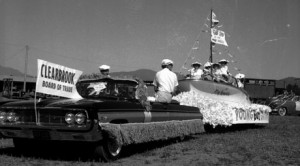More of British Columbia’s unique and storied past will soon be accessible online thanks to the latest funding round from the B.C. History Digitization Program (BCHDP).
The program, launched by the Irving K. Barber Learning Centre in 2006, provides matching grants to support projects that make B.C. heritage freely accessible to the public via the Internet. This year, more than $203,000 in matching funds was allocated for 24 projects throughout the province. In total, the BCHDP has awarded more than $1.2 million for 144 grants over the past seven years.
“On behalf of the Irving K. Barber Learning Centre we are pleased to support this year’s B.C. History Digitization projects,” says Chris Hives, University Archivist and BCHDP Coordinator. “We view this community partnership as an investment in assisting B.C. institutions to digitize their unique historical resources and make them more broadly accessible.”
Newspapers across the province – ranging from titles in Prince George, Prince Rupert and Chilliwack to student publications at the British Columbia Institute of Technology and Trinity Western University – will be digitized as part of this latest round of projects. British Columbia Sessional Papers and City of Vancouver council minutes from the 1970s are also on the agenda, as are items from the Nikkei National Museum’s Japanese Canadian Redress Digitization Project, mountaineering photos from an alpine photographs collection at Simon Fraser University Library and negatives from the first 20 years of the Western Front, an artist-run centre in Vancouver.
“The B.C. History Digitization Program is an amazing resource that allows us to make Japanese Canadian historic resources easily accessible to the general public, students and educators,” says Beth Carter, Director-Curator of the Nikkei National Museum in Burnaby. “The history of Japanese Canadians in B.C. is not well known. We hope these new online resources will help facilitate a greater recognition and a better understanding of this important history, which ranges from early immigration experiences to the struggles in the internment camps in the interior of B.C. We truly appreciate the ongoing support of the Irving K. Barber Learning Centre.”
For more information and to view images of past projects, please visit the B.C. History Digitization Program.
